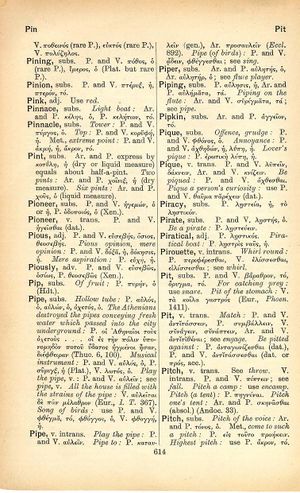piper
ὡς οὐδὲν γλύκιον ἧς πατρίδος οὐδὲ τοκήων γίνεται, εἴ περ καί τις ἀπόπροθι πίονα οἶκον γαίῃ ἐν ἀλλοδαπῇ ναίει ἀπάνευθε τοκήων → More than all pleasures that were ever made parents and fatherland our life still bless. Though we rich home in a strange land possess, still the old memories about us cling.
English > Greek (Woodhouse)
subs.
Ar. and P. αὐλητής, ὁ, Ar. αὐλητήρ, ὁ; see flute player.
Latin > English (Lewis & Short)
pĭper: pĭpĕris, n., = πέπερι (Sanscr. pippali or pippalī, the same),
I pepper.
I Lit., Plin. 12, 7, 14, § 26 sq.; Cels. 2, 27: et piper et quicquid chartis amicitur ineptis, Hor. Ep. 2, 1, 270; Ov. A. A. 2, 417; Juv. 14, 293: rugosum piper, Pers. 5, 55: sacrum piper, a term intimating that the miser is as sparing of it as if it were something sacred, id. 6, 21.—
II Trop., of sharp, biting speech: piper, non homo, Petr. 44; Hier. Ep. 31, n. 2.
Latin > French (Gaffiot 2016)
pĭpĕr,¹² ĕris, n. (πέπερι), poivre : Cels. Med. 2, 27 ; Hor. Ep. 2, 1, 270 || [fig.] esprit caustique : Petr. 44, 7.

